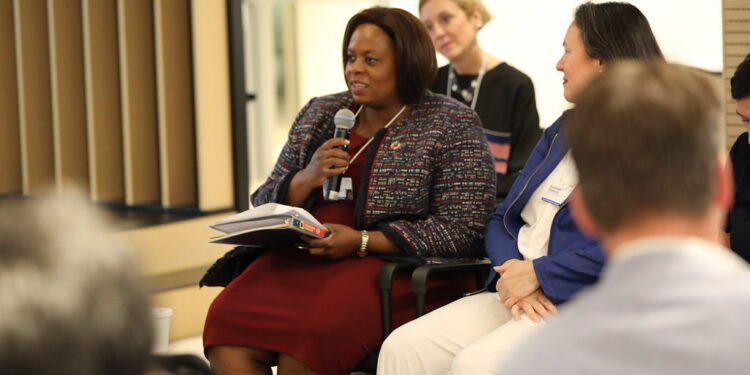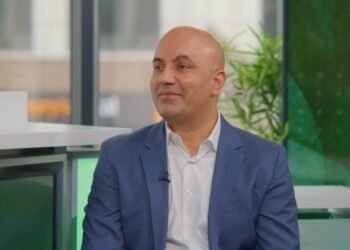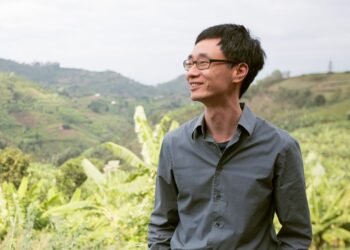What if one person could bridge the gap between global business interests and urgent sustainability needs? Sanda Ojiambo’s remarkable journey from Kenya to the United Nations proves this vision is not only possible but already in motion.
As Assistant Secretary-General and Executive Director of the UN Global Compact, Ojiambo leads the world’s largest corporate sustainability initiative. She assumed leadership in June 2020 and was promoted to her current role in April 2022.
The Global Compact brings together over 15,000 members across 160 countries. This includes businesses and non-business stakeholders committed to sustainable development.
Her work addresses critical global issues like climate change and sustainable policy development. Ojiambo’s leadership provides valuable insights into how companies can drive meaningful change.
Key Takeaways
- Sanda Ojiambo leads the UN Global Compact as Assistant Secretary-General and Executive Director
- She oversees the world’s largest corporate sustainability initiative with global reach
- The organization includes over 15,000 members across 160 countries
- Her work focuses on sustainable development and climate change issues
- Ojiambo provides crucial leadership insights for business sustainability
- Her background brings unique perspective to international development work
- The Global Compact drives policy change and corporate responsibility
Early Life and Educational Foundation
Every great leader’s journey begins with formative experiences that shape their worldview. The educational path chosen often reveals early signs of future accomplishments in global leadership roles.
Formative Years in Kenya
Growing up in Nairobi provided unique perspectives on international development challenges. Early exposure to global inequalities sparked a lifelong commitment to addressing systemic issues.
Local Kenyan schools provided the foundational training that would later support advanced academic work. These formative years built the critical thinking skills essential for policy analysis.
International Development Studies at McGill University
Undergraduate studies at McGill University marked a significant step in academic development. The Economics and International Development degree program offered comprehensive training in global economic systems.
This educational experience provided deep insights into economic disparities across different countries. The program emphasized data-driven approaches to understanding development challenges.
University coursework focused on practical solutions for creating positive change in developing nations. This training directly informed later professional work in the international development field.
Public Policy Master’s at University of Minnesota
Graduate studies at the University of Minnesota’s Humphrey School represented advanced training in policy analysis. The Master of Arts in Public Policy degree focused specifically on international policy issues.
Academic performance included working as a teaching assistant for Professor Samuel Myers Jr. This role further developed mentoring and leadership skills.
The final research paper analyzed HIV/AIDS policy in Uganda, demonstrating early policy analysis capabilities. This work showcased ability to handle complex data and recommend policy change.
This educational background provided the perfect foundation for a career dedicated to development work. The combination of economics and policy training proved invaluable for addressing global issues.
Professional Journey and Career Progression
Professional development often starts where needs are greatest, shaping future leaders through direct experience. The career path demonstrates how diverse roles build comprehensive skills for global leadership positions.
Humanitarian Work with CARE International and UNDP
The professional journey began in 1997 with humanitarian service at CARE International in Somalia. This early experience provided critical training in complex development environments.
Five years were spent leading diverse programs across education and environmental conservation. Work included safe motherhood initiatives and landmine demining operations.
Governance projects formed another essential component of this foundational period. This hands-on field experience built practical policy implementation skills.
Technical Advisory Role at International Planned Parenthood Federation
Transition to the Africa Regional Office brought technical advisory responsibilities across 40 countries. Service delivery systems required comprehensive accreditation standards development.
Financial management and governance structures needed consistent improvement across diverse organizations. Advocacy work became increasingly important during this five-year period.
The role demonstrated how technical expertise supports broader development objectives. This experience refined advisory and capacity-building skills.
Sustainable Business Leadership at Safaricom
Corporate experience began in 2008 as senior manager of foundation programs. Public-private partnerships with United Nations organizations became a primary focus.
Promotion to head of Sustainable Business and Social Impact occurred in 2010. This leadership position involved directing the Corporate Responsibility Department.
Sustainability reporting integrated directly with technology for development products. The Sustainable Development Goals framework guided all corporate responsibility initiatives.
This corporate experience provided essential preparation for global compact leadership. Business sustainability practices developed here would later influence international policy.
Sanda Ojiambo’s Transformative Leadership at UN Global Compact
The appointment of new leadership can redefine an organization’s impact on pressing global issues. This executive brought fresh perspective to corporate responsibility during a period of unprecedented challenges.
Appointment as Executive Director and Assistant Secretary-General
June 2020 marked a significant milestone during the COVID-19 pandemic. The United Nations selected a new executive director for its flagship corporate sustainability initiative.
This leadership transition occurred when global business faced extraordinary pressures. Pandemic constraints initially required remote work from Nairobi before relocating to New York City.
April 2022 brought further recognition through promotion to Assistant Secretary-General. This achievement positioned the leader among the highest-ranking Kenyans at the global organization.
Business Ambition for 1.5°C Climate Initiative
The climate crisis demanded urgent corporate action through innovative programs. The Business Ambition for 1.5°C climate initiative emerged as a groundbreaking response.
This program challenges business leaders to set science-based targets for greenhouse gas emissions. These targets align with the critical 1.5-degree pathway recommended by climate scientists.
Participation statistics demonstrate remarkable success across diverse sectors. Over 300 companies from 42 sectors and 50 countries have committed to this ambitious program.
Promoting the 10 Principles of Corporate Sustainability
Corporate responsibility requires clear guidelines for meaningful change. The 10 Principles provide comprehensive framework for sustainable business practices.
These principles cover four essential areas of corporate responsibility. Human rights protection forms the foundation of ethical business operations.
Labor standards ensure fair treatment and working conditions for employees. Environmental protection addresses ecological impacts of business activities.
Anti-corruption measures maintain integrity in corporate governance systems. This holistic approach guides members toward comprehensive sustainable development.
The philosophy emphasizes long-term sustainability over short-term profits. Business organizations possess unique positioning to advance practical solutions.
Building bridges among the UN, governments, and business community remains essential. These partnerships create collaborative approaches to global challenges.
Conclusion
Today’s sustainability professionals require both technical knowledge and adaptable soft skills to drive meaningful change. The journey from humanitarian work to corporate leadership to United Nations executive demonstrates this comprehensive approach.
Board service across investment, gender rights, and development organizations shows broad expertise. Sustainability integration needs cross-departmental implementation, not isolated efforts.
Policy analysis training provides essential problem-solving tools for complex development issues. Corporations now recognize sustainability challenges more than ever before.
This leadership approach combines global awareness with practical policy solutions. The result is effective sustainable development across business and international organizations.
FAQ
What is the United Nations Global Compact?
The United Nations Global Compact is a voluntary initiative that encourages businesses worldwide to adopt sustainable and socially responsible policies. It promotes ten universal principles in the areas of human rights, labor, environment, and anti-corruption.
What are the 10 Principles of the UN Global Compact?
The 10 Principles cover four key areas: human rights, labor standards, environmental protection, and anti-corruption. They guide companies in aligning their operations and strategies with universal values for a more sustainable global economy.
What is the Business Ambition for 1.5°C campaign?
The Business Ambition for 1.5°C campaign is a global initiative urging companies to set ambitious climate targets aligned with limiting global temperature rise to 1.5°C above pre-industrial levels, in line with the Paris Agreement.
How does the UN Global Compact support corporate sustainability?
The UN Global Compact supports corporate sustainability by providing frameworks, resources, and networking opportunities. It helps companies implement the Ten Principles, advance the Sustainable Development Goals, and report on their progress.
What kind of companies can join the UN Global Compact?
Companies of all sizes and from all industries can join the UN Global Compact. Participation is open to any business committed to aligning its operations and strategies with the Ten Principles and reporting on its progress.
How does the UN Global Compact measure impact?
The UN Global Compact measures impact through its Communication on Progress (COP) reports, where member companies disclose their efforts to implement the Ten Principles. It also tracks collective action through initiatives and partnerships.





